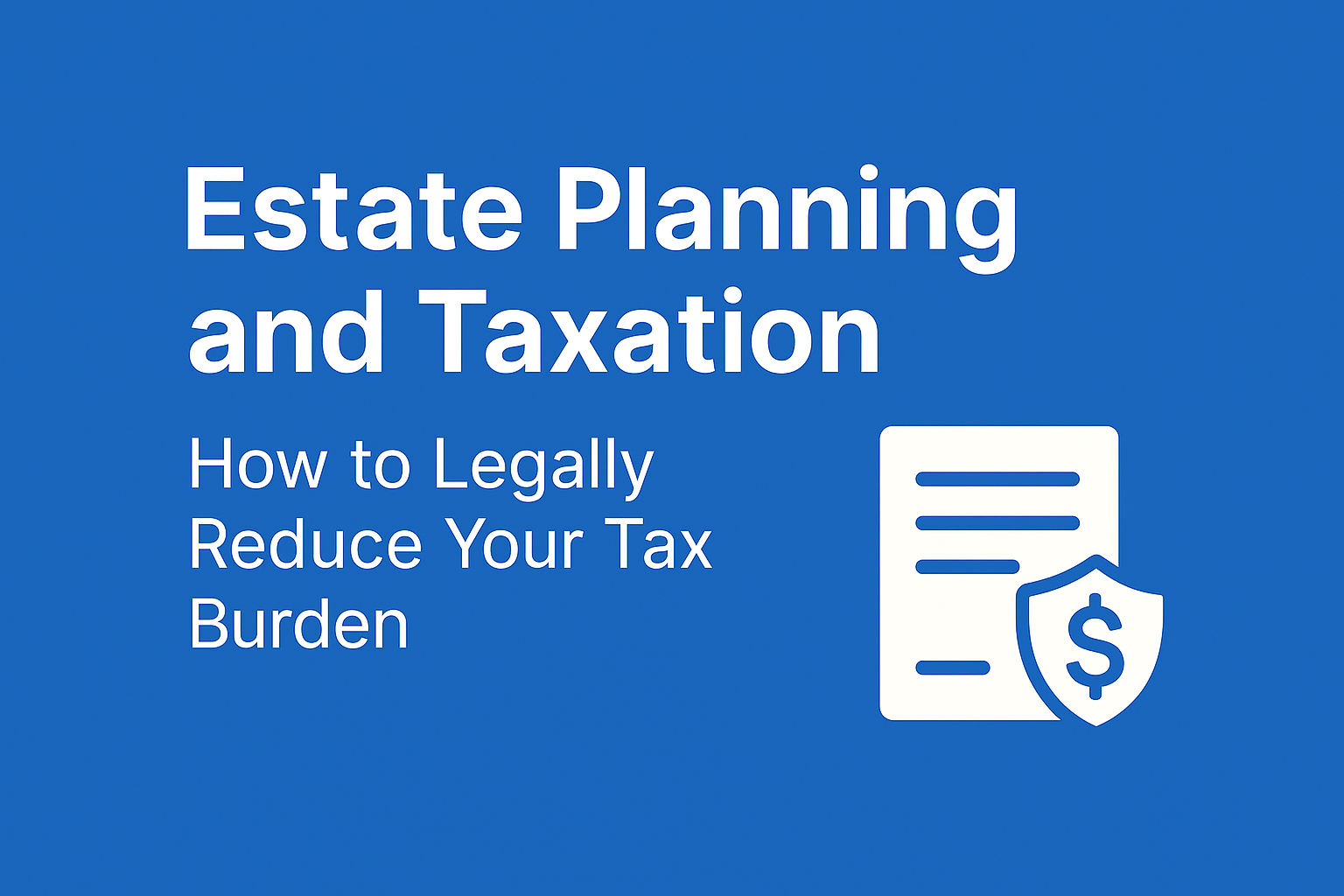Estate Planning and Taxation: How to Legally Reduce Your Tax Burden

Estate planning is more than just deciding who inherits your property—it's also a powerful tool for legally reducing your tax burden. With careful planning, you can protect your legacy and ensure that your loved ones receive the maximum benefit from your estate.
In this blog, I'll walk you through essential estate planning strategies, focusing on ways to effectively manage and reduce your estate tax and gift tax liabilities.
What Is Estate Planning and Why Is It Important?
Estate planning is the process of arranging for the management and disposal of your assets during your lifetime and after your passing. Proper estate planning ensures:
- Your assets are distributed according to your wishes.
- Your beneficiaries minimize taxes owed on inheritances.
- Your estate bypasses unnecessary legal complexities, such as probate.
Understanding how estate tax and gift tax work is central to effective estate planning.
Understanding Estate and Gift Taxes
Before diving into strategies, let’s clarify these two significant tax implications:
Estate Tax
The estate tax applies to the transfer of your assets upon your death if your estate exceeds a certain value. In 2025, the federal estate tax exemption is projected to be around $14 million per individual (approximately $28 million for married couples), with a tax rate of up to 40%.
Gift Tax
Gift tax applies to the transfer of assets during your lifetime. It shares a unified exemption limit with the estate tax. You can gift up to a certain amount each year per individual without incurring gift taxes. For 2025, this annual gift exclusion is projected to be around $19,000 per recipient.
Strategies to Legally Reduce Your Estate and Gift Tax Burden
Implementing effective estate planning strategies can significantly reduce or even eliminate the estate and gift taxes your family might otherwise face.
1. Maximizing Annual Gift Exclusions
One straightforward way to reduce estate taxes is through the annual gift exclusion. You can give up to the annual limit per recipient tax-free each year, reducing your taxable estate incrementally.
Example:
If you're married and have three children and four grandchildren, you can gift up to $266,000 annually (approx. $38,000 per recipient as a couple), significantly decreasing the size of your taxable estate.
2. Using the Lifetime Gift and Estate Tax Exemption Wisely
The lifetime exemption allows individuals to gift or transfer substantial assets during their lifetime tax-free. Utilizing this exemption strategically to transfer appreciating assets early can dramatically reduce your taxable estate.
Key tip:
Gifting appreciating assets like real estate or stocks allows their growth to occur outside your taxable estate, minimizing future estate tax liability.
3. Establishing Trusts to Minimize Taxes
Trusts are fundamental in reducing estate and gift taxes. Two primary types of trusts are especially beneficial:
Revocable Living Trust
This type of trust allows you to maintain control over your assets while simplifying probate. Although it provides limited direct tax benefits, it helps streamline the distribution of assets.
Irrevocable Trust
An irrevocable trust removes assets from your estate entirely, significantly reducing your taxable estate. Assets in an irrevocable trust grow tax-free from an estate tax perspective, and beneficiaries typically avoid estate taxes on these assets.
- For more details: Revocable vs. Irrevocable Trust: Understanding the Key Differences
https://betterwealth.com/blog/revocable-vs-irrevocable-trust-key-differences
4. Charitable Donations and Trusts
Charitable giving provides an excellent way to minimize estate taxes. Donations made to qualified charities are deductible from your estate, lowering the estate's taxable value. Additionally, setting up charitable trusts allows you to provide long-term support for your chosen causes while optimizing your estate's tax efficiency.
5. Family Limited Partnerships (FLPs)
Family Limited Partnerships allow you to transfer ownership of businesses or significant assets to family members while retaining control. This method allows you to gift partnership shares at discounted valuations, effectively lowering your taxable estate and reducing estate taxes.
6. Direct Payments for Education and Medical Expenses
You can make unlimited direct payments to educational institutions or healthcare providers on behalf of others without incurring gift taxes. This strategy is an efficient way to decrease your taxable estate while directly benefiting family members.
7. Leveraging Life Insurance Policies
Life insurance proceeds generally pass tax-free to beneficiaries. By establishing an Irrevocable Life Insurance Trust (ILIT), life insurance benefits are excluded from your taxable estate, substantially reducing estate tax liabilities.
Common Misconceptions About Estate and Gift Taxes
Misconception #1: "Estate Taxes Only Affect the Wealthy"
While high exemptions exist, appreciating asset values can quickly push moderately-sized estates into taxable territory, especially considering state-level estate taxes.
Misconception #2: "Giving Assets Away Always Results in Taxes"
The annual gift tax exclusion and lifetime exemptions mean most people can gift substantial amounts without ever incurring gift taxes.
Misconception #3: "Estate Planning Is Only About Taxes"
Estate planning involves managing assets, protecting beneficiaries, minimizing legal complications, and addressing your wishes—not just taxes.
Actionable Steps for Effective Estate and Tax Planning
To ensure you're optimizing your estate tax strategy:
- Regularly review your estate plan and update it to reflect tax law changes.
- Consult a qualified estate planning attorney to tailor strategies to your specific situation.
- Consider setting up appropriate trusts and gifting strategies early to maximize benefits.
Final Thoughts: Protect Your Legacy and Minimize Taxes
Estate and gift taxes can significantly reduce the legacy you leave behind. However, careful and strategic planning can mitigate or eliminate these tax liabilities, preserving more of your estate for future generations.
At BetterWealth, we understand that effective estate planning requires expertise, precision, and personalization. Our dedicated advisors can help you craft a tailored strategy designed to minimize your estate tax and gift tax burdens while securing your family's financial future.
To get started, schedule a consultation with our experienced estate planning specialists today.
Sources & Further Reading:
- IRS, “Estate Tax”
- IRS, “Gift Tax”
- NAIC, “Trust Basics”
- BetterWealth, “Revocable vs. Irrevocable Trust: Understanding the Key Differences”





